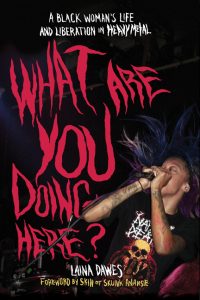
Though metal has traditionally been a rigidly white and male dominated universe, it spoke loudly to a young Laina Dawes. In her groundbreaking heavy metal memoir, “WHAT ARE YOU DOING HERE? A Black Woman’s Life and Liberation in Heavy Metal,” Dawes chronicles the good, bad and ugly sides of being a black woman navigating the metal and punk scenes, and challenges the assumptions and prejudices related to that journey.
Ghettoblaster recently spoke with Dawes about her groundbreaking memoir and experiences with punk and metal. This is what she told us…
Do you remember the moment that you first heard punk or metal? What was the album and the band and what was your reaction?
The first moment was seeing the Made-for-TV movie KISS Meets the Phantom of the Park when I was around eight or so. I was intrigued by the makeup and the costumes, and that led me to want to know more. I asked for their latest album for my next birthday. I’ve said this as almost an apology before, but while KISS served as an introduction to metal, a combination of Judas Priest, my older sister’s The Clash, Violent Femmes and ACDC records, and my teenage neighbor’s penchant for blasting Deep Purple and Black Sabbath at nigh,t all provided a sense of fascination that really got me interested in the music.
For you personally, what are the best and worst things about being a black woman in the punk and metal scenes?
The best and worst things are intermingled. I am going to be a tad sarcastic when I say this, but one of the best things is that there are no expectations, so you might as well just ‘do’ you. One of the common issues I hear from black women metal fans and something that I still struggle with, is the feeling of being invisible. It is hard to describe the feeling when people are so perplexed with your presence they just decide that you don’t exist and will literally try and walk through you, or you are introduced to someone, you put out your hand, and the person doesn’t acknowledge that you are standing there. In times like that, don’t feel bad or sorry for yourself, just say ‘fuck it’ and do you. If you want to get trashed, tear off your clothes off, jump onstage and punch the singer in the face, why the fuck not? turn that frown upside down!
“We” as black women are forced to have a tough exterior. We are used to always having to prepare for more negativity than positivity. The reason why the women I interviewed and myself are really into the metal, hardcore and punk scenes is more the most part, it is one of the few spaces in our lives that we actually feel that we can escape from the day-to-day bullshit and absorb the music and the scene. However, while I’d prefer to leave my tough exterior outside the door, there are times when you need to wear it to emotionally protect yourself from those times when you are excluded. I’m hoping that with this book, we will be able to permanently remove our armor and just be accepted as who we are as individuals.
Did you ever have an experience with a band or musician that validated why this passion was the right path for you?
I became passionate about the music the same way as a lot of kids do, and when I got older and looked back at how miserable I was and how listening to metal in my bedroom got me through some difficult times, I think that was validation enough. Just knowing that there was nothing really different about why I was drawn to the music, was no different than a lot of people was validation enough. I never really needed to be accepted by anyone else or see another black person at a show or onstage to validate my passion for the music. I don’t think anyone does. I think people are more concerned with just wanting to be treated the same way as any other metal fan at a show, and do not want their race or gender to have anything to do with it.
How do other non-white individuals react to your enthusiasm for this music?
It has varied. I think some people were surprised that black women fans faced just as much hostility from black folks as they do white and people from other cultural backgrounds. There will always be those whom in order to make themselves feel or look better in society’s eyes, will not hesitate to shut you down if they feel that you are not adhering to their limited view of what a black woman should be.
What catalyst or catalysts inspired you to write this book?
The main catalyst was to create a space in which black women fans could talk about their experiences, as while they are unique in terms of how ethnicity and gender affect how we consume and are perceived within extreme music genres, the reasons why we are drawn to the music are quite similar to our male counterparts. I think that people tend to forget that the world isn’t as racially segregated as they think it is – that people aren’t so radically different. Black people have access to a myriad of different musical genres, just like white folks, and people are attracted to music styles for the same reason. I think that by showing how the passion for metal, hardcore and punk music crosses both gender, ethnicity, class and geographic locale, it might stop idiots whom in 2013 still think that they have the right to disrespect people based on their chosen musical preference because it doesn’t fit into their limited view of their world.
Do you feel like you succeeded in telling your story?
I think so. Because this book is the first of its kind, it is what it is. I did the best I could have done right now. I do hope to expand it in the future, though as I’m sure there are other stories to tell.
Who else did you interview for the book and did you find that their experiences mirrored your own?
There were a number of women – probably all of them in one way or another whose experiences mirrored my own, which made me feel a lot more sane about how I viewed certain experiences I’ve faced. One of my interviewees, Monique, was also adopted and I really resonated with her experiences growing up and because of that I feel protective of her, but she is such a strong, amazing woman that she will be just fine!
Do you think that diversity is one of the keys to building healthy communities? Do you think the punk and metal communities are healthy and inclusive?
I think that the key to building a healthy community is accepting that people might come from different walks of life, but that there is one commonality – in this case, it is the passion for whatever musical genre they are into. Because the metal and punk scenes are still culturally maligned, it is imperative that the community thrives together to keep it alive. It’s more important that people support the music by attending shows, buying merch and buying the music. It’s really disheartening that some people will not actively support the community because they are afraid of their safety, or they are afraid that they will be rejected because of their gender, sexual preference, or their ethnicity.
Do you believe access to information via the Internet will lead to significantly increased participation in these genres by black females?
I definitely think it has. People have the relative ease in listening to whatever they want to. However, to me the live performance is crucial, so I hope to see more black women and men at shows! But that is the most difficult part.
Right now who is your favorite band and why?
Right now I’m loving this band from Vancouver, Anciients. Their album Heart of Oak is amazing. I think people are going to really be talking about them this year. I have also been listening to Sannhet’s Known Flood, which is a great debut. I’m looking forward to a new release by Lesbian this year, who is one of my favorite bands.
(Check out Laina’s appearance on NPR’s Morning Edition: http://www.npr.org/2013/01/04/167707991/the-life-and-liberation-of-a-black-female-metal-fan.)



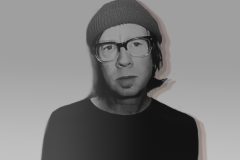
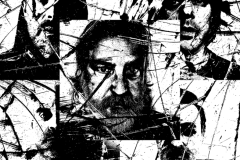
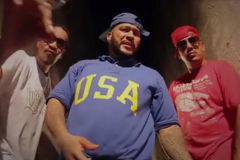
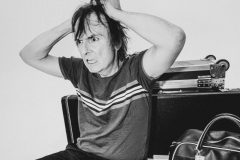

Social Media